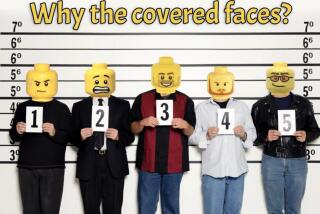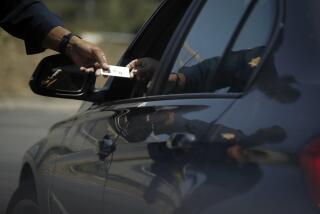‘COPSLIE’ license plate is protected by free speech, court rules
Though it might insult police officers and make them want to pull him over, a New Hampshire man’s car could soon be sporting a license plate reading “COPSLIE.”
David Montenegro, whose legal name is “human,” sued the state’s Division of Motor Vehicles after officials rejected his vanity license plate application on the grounds that it accused police officers of “moral turpitude.” Citing DMV rules, the officials said “COPSLIE” was offensive to the good taste of a reasonable person.
On Wednesday, New Hampshire’s top court struck down the DMV’s “good taste” standard as vague and in violation of the state constitution’s free speech clause because it allows for arbitrary and discriminatory decisions.
“Because the ‘offensive to good taste’ standard is not susceptible of objective definition, the restriction grants DMV officials the power to deny a proposed vanity registration plate because it offends particular officials’ subjective idea of what is ‘good taste,’” the New Hampshire Supreme Court wrote in a 5-0 decision.
The ruling included definitions from Webster’s Third New International Dictionary and said that the definitions opened the doors to several interpretations of the regulation.
“One such interpretation could be that no vanity registration plates are allowed that are ‘insulting to the standard of morality or virtue of individual preference,’” the court wrote. “This reading alone demonstrates the arbitrariness of determining whether a vanity registration plate is ‘offensive to good taste.’”
Montenegro, the name used in court documents, challenged the DMV after they rejected “COPSLIE” but issued him one of his backup choices, “GR8GOVT.”
The New Hampshire Civil Liberties Union, which supported Montenegro, said the case was an important victory for free speech rights.
“It reaffirmed that the basic principle that a law that delegates to government officials the power to accept or deny speech based on their own views is unconstitutional,” Gilles Bissonnette, a staff attorney, told the Los Angeles Times.
“I don’t think most people fight for their free speech rights, so ‘human’ should be commended for bringing this to the Supreme Court,” Bissonnette said.
The New Hampshire Attorney General’s office, which represented the DMV, said it was reviewing the decision. The state had argued that it was not prohibiting speech, but rather merely setting a generally acceptable standard for speech on government property.
More to Read
Start your day right
Sign up for Essential California for news, features and recommendations from the L.A. Times and beyond in your inbox six days a week.
You may occasionally receive promotional content from the Los Angeles Times.






